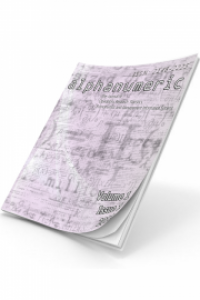Kısmi En Küçük Kareler Yapısal Eşitlik Modellemesiyle (PLS-YEM) Nükleer ve Yenilenebilir Enerjiye İlişkin Tutumların Araştırılması
Abstract
Çalışmada, üniversite öğrencilerinin çevresel kaygılarının, nükleer enerji santrallerine ve yenilenebilir enerjiye ilişkin tutumlarının sürdürülebilir tüketim davranışlarına etkisi kısmi en küçük kareler yapısal eşitlik modellemesiyle (PLS-YEM) ile araştırılmıştır. Bu amaçla önce, literatür taraması yardımıyla bir araştırma modeli tasarlanmış ve modeldeki ilişkileri sınamak için çeşitli hipotezler oluşturulmuştur. Önerilen modelde sürdürülebilir tüketim davranışı içsel, çevresel kaygı dışsal ve diğerleri aracı içsel gizil değişkendenler olarak tanımlanmıştır. Çalışmada, önerilen araştırma modeli PLS-YEM kullanılarak analiz edilmiş ve önerilen modelin uygunluğu çeşitli uyum ölçütlerine göre değerlendirilmiştir. Model, istatistik bölümü ve mühendislik fakültesi öğrencileri için ayrı ayrı analiz edilmiştir. İstatistik bölümü modelinde, çevresel kaygıdaki bir birimlik artış, yenilenebilir enerjinin ekonomik ve çevre boyutuna yönelik tutumlarda sırasıyla 0,39 birim, 0,60 birim artışa neden olmaktadır. Mühendislik öğrencileri modelinde ise bu katsayılar sırasıyla 0,40 ve 0,57 olarak hesaplanmıştır. Ayrıca, yenilenebilir enerjiye yönelik ekonomik ve çevre tutumların, sürdürülebilir tüketim davranışına etkisi incelendiğinde, istatistik bölümü için sadece ekonomik boyutun anlamlı olduğu (0,46), mühendislik öğrencilerinde ise her iki boyutun anlamlı olduğu belirlenmiştir. Mühendislik öğrencilerinin yenilenebilir enerjinin ekonomik ve çevre boyutuna yönelik tutumlarındaki bir birimlik artışın, sürdürülebilir tüketim davranışında sırasıyla 0,24 ve 0,23 birim artışa neden olacağı hesaplanmıştır.
Keywords
Kısmi En Küçük Kareler Yapısal Eşitlik Modellemesi Yenilenebilir Enerji Nükleer Enerji Sürdürülebilir Tüketim Davranışı
References
- Referans1: DR.ÖGR. ÜYESİ ERKAN ARI, DUMLUPINAR ÜNİVERSİTESİ, İİBF, EKONOMETRİ BÖLÜMÜ, erkan.ari@dpu.edu.trReferans2: PROF.DR. ZEKİ YILDIZ, ESKİŞEHİR OSMANGAZİ ÜNİVERSİTESİ, zyildiz@ogu.edu.trReferans3: PROF. DR. MURAT ATAN, HACI BAYRAM VELİ ÜNİVERSİTESİ, İİBF., EKONOMETRİ BÖLÜMÜ, atan@gazi.edu.tr
Investigation of Attitude About Nuclear and Renewable Energy by Using Partial Least Squares Structural Equatıon Modeling
Abstract
In the study, the effects of university students' environmental concerns, nuclear power plants and renewable energy attitudes on sustainable consumption behavior were investigated with partial least squares structural equation modeling (PLS-SEM). For this purpose, a research model was designed with literature search and various hypotheses were developed to test the model relations. In the proposed model, sustainable consumption behavior is defined as endogenous, environmental concern is exogenous, and others are defined as endogenous latent variables. In the study, the proposed research model was analyzed using PLS-SEM and the suitability of the proposed model was evaluated according to various compliance measures. The model was analyzed separately for statistics department and engineering faculty students. In the statistical department model, one-unit increase in environmental concern causes 0.39 unit, 0.60 unit increase in attitudes towards economic and environmental dimension of renewable energy, respectively. In the engineering students model, these coefficients were calculated as 0.40 and 0.57, respectively. In addition, when the effect of economic and environmental attitudes towards renewable energy on sustainable consumption behavior is analyzed, it is determined that only economic dimension is meaningful (0.46) for statistical section and both dimensions are significant for engineering students. It was calculated that a one-unit increase in the attitudes of the engineering students towards the economic and environmental dimensions of renewable energy would lead to an increase of 0.24 and 0.23 units respectively in the sustainable consumption behavior.
Keywords
Renewable Energy Nuclear Energy Sustainable Consumption Behavior Partial Least Squares Structural Equation Modeling
References
- Referans1: DR.ÖGR. ÜYESİ ERKAN ARI, DUMLUPINAR ÜNİVERSİTESİ, İİBF, EKONOMETRİ BÖLÜMÜ, erkan.ari@dpu.edu.trReferans2: PROF.DR. ZEKİ YILDIZ, ESKİŞEHİR OSMANGAZİ ÜNİVERSİTESİ, zyildiz@ogu.edu.trReferans3: PROF. DR. MURAT ATAN, HACI BAYRAM VELİ ÜNİVERSİTESİ, İİBF., EKONOMETRİ BÖLÜMÜ, atan@gazi.edu.tr
Details
| Primary Language | Turkish |
|---|---|
| Journal Section | Articles |
| Authors | |
| Publication Date | June 30, 2019 |
| Submission Date | September 17, 2018 |
| Published in Issue | Year 2019 Volume: 7 Issue: 1 |
Cited By
HAVAYOLLARINDA KURUMSAL SOSYAL SORUMLULUK İMAJININ TÜKETİCİ SADAKATİ ÜZERİNDEKİ ETKİSİ
Dicle Üniversitesi Sosyal Bilimler Enstitüsü Dergisi
https://doi.org/10.15182/diclesosbed.1450101
LOJİSTİKTE DIŞ KAYNAK KULLANIMI, LOJİSTİK MALİYETLER VE FİNANSAL PERFORMANS ARASINDAKİ İLİŞKİNİN ANALİZİ
Mersin Üniversitesi Denizcilik ve Lojistik Araştırmaları Dergisi
https://doi.org/10.54410/denlojad.971226
KADIN ÖĞRETMENLERİN PSİKOLOJİK TACİZ ALGISININ ÇOCUKLARI İLE İLİŞKİSİNE ETKİSİ: KOSOVA ÖRNEĞİ
Bilge Uluslararası Sosyal Araştırmalar Dergisi
https://doi.org/10.47257/busad.1187903
ATTITUDES OF INDIVIDUALS ABOUT USING CRYPTOCURRENCIES: EVIDENCE FROM TURKEY
İstanbul Ticaret Üniversitesi Sosyal Bilimler Dergisi
https://doi.org/10.46928/iticusbe.793380
Alphanumeric Journal is hosted on DergiPark, a web based online submission and peer review system powered by TUBİTAK ULAKBIM.


